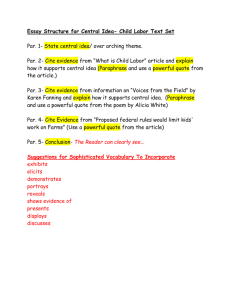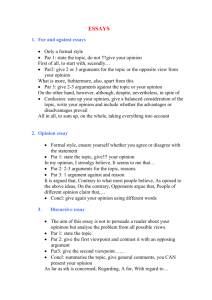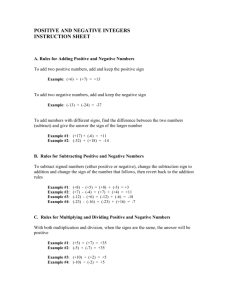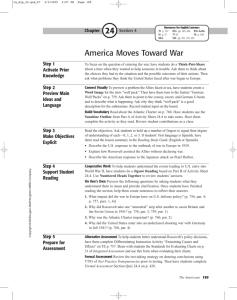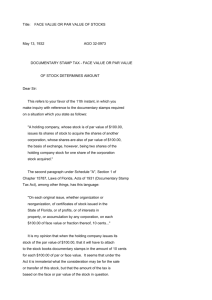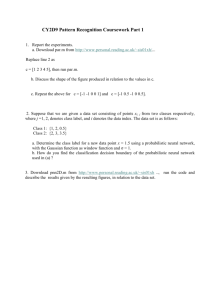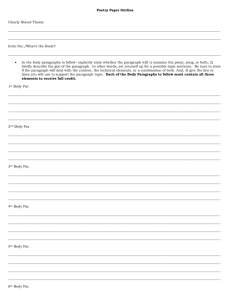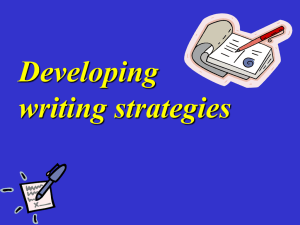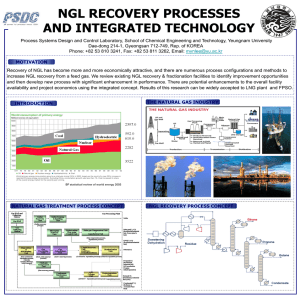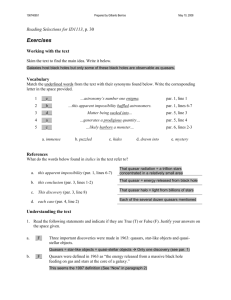Reading and Vocabulary Focus Brochure
advertisement
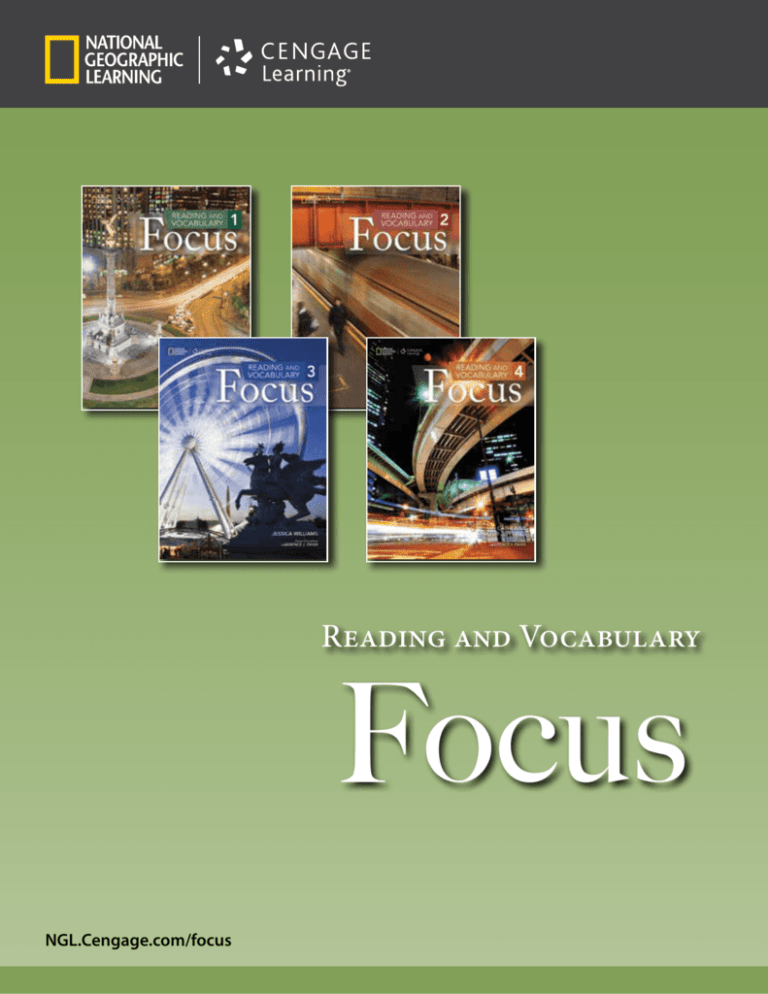
Reading and Vocabulary Focus NGL.Cengage.com/focus r Face Reading and Vocabulary Focus An all-new, four-level reading series that provides the essential reading skills and vocabulary development for maximum academic readiness. Readings grounded in rich National Geographic content tap into learners’ curiosity about the world, naturally encouraging inquiry and opportunities to use information. READING 1 Academic Vocabulary a category a culture effective to focus to interpret a reaction Multiword Vocabulary to be the mirror image of a facial expression Does a smile mean the same thing all over the world? Are facial expressions universal? The answer is both yes and no. no matter whether to pay attention to wide open in turn In You Face Reading Preview Preview. Read the title of Reading 1 and look at the photos and small chart on pages 168–171. Then discuss the following questions with a partner or in a small group. 1. How are the people in the pictures feeling? 2. In your opinion, which emoticon in Figure 1 on page 171 best shows the feeling of happiness? Which one best shows the feeling of sadness? Topic vocabulary. The following words appear in Reading 1. Look at the words and answer the questions with a partner. biological confusion disgust express fear happiness physical read senses social 1. Which words relate to emotions? 2. Which words can be used to talk about humans or their bodies? 3. Which words relate to showing and understanding expressions? VOCA A man from Rajasthan, India wearing traditional clothes and turban Acad Fi th Predict. What do you think this reading will be about? Discuss each word in Exercise B and predict how it may relate to the reading. 168 Re UNIT NINE Expressions In Your Face 1. 9781285173313_RVF2_Final_File.indd 168 Academic Vocabulary sections develop the words and phrases that students will encounter in academic readings. Topic Vocabulary is presented as a reading preview strategy to enhance learner comprehension of the text. 11/21/13 11:20 AM 9781285173313_RVF2_Final_File.indd 169 2. Multiword Vocabulary sections identify words and phrases that are commonly grouped together and then prompt learners to work with them in different contexts for enhanced comprehension. 3. 4. 5. 6. Mult Fi un 174 9781285173313_RVF2_Fi NGL.Cengage.com/focus Reading Skill Understanding Connectors of Contrast There are many different ways to show contrast between sentences. You may be familiar with connectors of direct contrast that show opposite ideas, such as however: She wants to visit Brazil; however, her husband does not. Not all contrast connectors express such a direct contrast. Some of them have specialized meanings or restrictions. 1. instead After each reading, learners are taught an essential reading skill and then apply that skill to the reading. We didn’t go to Brazil; instead, we spent our vacation money on a new roof. The sentence or clause before instead says what did not happen. The sentence or clause that follows instead says what did happen. 2. nevertheless She has always wanted to visit Brazil; nevertheless, she spends all of her vacations in Latvia. A reader would expect her to go to Brazil on vacation. Nevertheless introduces a surprise that contrasts with a reader’s expectation. 3. on the other hand Brazil is an exciting place to visit; on the other hand, Chile is also a great travel destination. Brazil is an exciting place to visit; on the other hand, it is awfully hot this time of year. On the other hand introduces contrasting information or an alternative. For each of the paragraphs in Reading 2 listed below, find the sentence with a sentence connector. Then write the sentence connector and answer the questions. The first one is done for you. 1. Paragraph 2 Sentence connector: instead What doesn’t happen? Visitors don’t add to the suffering. What does happen? They promote education. 2. Paragraph 3 Sentence connector: A comprehensive, three-part vocabulary development program builds student confidence as learners encounter new or unfamiliar words in academic texts. What is not true? ur e What is true? 3. Paragraph 4 Sentence connector: What contrasting information or alternative is offered? 4. Paragraph 5 Sentence connector: What is the reader’s expectation? How is the expectation contradicted? Write a sentence about disaster tourism that shows a contrast, using a sentence connector. Disaster Tourism ABULARY PRACTICE 9781285173368_RVF3_Final_File.indd 87 87 2:28 PM Complete the 11/8/13 following paragraph with the correct multiword vocabulary from Exercise A. demic Vocabulary Last month, we moved into a new apartment in my building. Every floor has two apartments and each one ind the words in bold in Reading 1. Use the context to help you match each word to he correct definition. the other. We only moved because we 1 thought this apartment was quieter than our other apartment, but, as it turns out, we were very 1. reaction (Par. 1) a. look at something closely 2. category (Par. 2) b. societies that are similar in their way of life 3. cultures (Par. 3) c. works well and produces the intended results leaves his doors and windows d. group of things that are similar noisier. He just doesn’t seem to care about anyone but himself. You can tell by his 4. focus (Par. 4) 5. interpret (Par. 5) e. decide on a specific meaning or significance 6. effective (Par. 6) f. something you feel, say, or do because of something else wrong. The neighbor next door makes noise at all times of the day. He plays music very loudly 2 4 5 11/21/13 11:20 AM 3 , which makes it even that he certainly doesn’t the needs of his neighbors! So, the other day, we decided to show him how it feels to have a bad neighbor. We started leaving our smelly garbage in the hall ead the following sentences and choose the best phrase to complete each one. 169 to the teacher’s announcement. They were delighted to go on a . The students all had a field trip. a. positive reaction b. new reaction . A good photo can be a a. highly effective it is the middle of the night or 5:00 in the morning. He in front of his apartment. Our next-door neighbor, , 6 started doing the same thing. He didn’t care. The hallway got so smelly, it was obvious to everyone. Finally, he moved out! Problem solved. way to communicate a complicated idea. b. simply effective Use the Vocabulary . Many celebrated the New Year, too. For example, the Egyptians celebrated the “Opening of the Year” festival in mid-July. a. new cultures b. ancient cultures Write answers to the following questions. Use the words in bold in your answers. Then share your answers with a partner. . Public speakers often just one person in the audience when they give a presentation. It can help them feel less nervous. a. focus on b. focus in 2. What would be your reaction if a friend needed to borrow money? How about if someone wanted you to help him cheat on a test? 1. What events in the news do you pay attention to? Why? 3. What is something you do that you are particularly effective at? . One fiction that is very popular right now is graphic novels. a. category on b. category of 4. What is one example of a behavior in your culture that is different in another culture? 5. Do you know someone who makes an unusual or interesting facial expression? Describe it. . Researchers after collecting the participants’ answers to the questionnaire. a. interpret the results b. interpret the analysis THINK AND DISCUSS tiword Vocabulary Work in a small group. Use the information in the reading and your own ideas to discuss the following questions. ind the multiword vocabulary in bold in Reading 1. Use the context to help you nderstand the meaning. Then match each item to the correct definition. 1. facial expressions 2. no matter whether 3. wide open (Par. 1) (Par. 2) 4. is the mirror image of 6. in turn (Par. 6) 2. Relate to personal experience. Has someone ever looked at your face and thought you were angry, happy, or sad when you weren’t? Have you looked at someone’s face and made a similar mistake? What happened? b. not depending on one thing or another c. open to the maximum extent (Par. 2) 5. pay attention to 1. Relate to personal experience. Think of someone you know well. What part of the face does this person use the most to express him- or herself? a. looks identical but is the reverse of something (Par. 5) (Par. 3) d. concentrate on 3. Apply knowledge. What do you think would be a good way to avoid miscommunication with someone from a different culture? e. the ways your features move to communicate f. in sequence or order UNIT NINE Expressions inal_File.indd 174 In Your Face 11/21/13 11:20 AM 9781285173313_RVF2_Final_File.indd 175 175 11/21/13 11:20 AM Reading and Vocabulary Focus Reading and Vocabulary Focus Level 1 Level 2 Level 3 Text 9781285173191978128517331397812851733689781285173412 eBook 9781285865744978128586575197812858657689781285865775 Audio CDs 9781285173276978128517333797812851733829781285173436 Text/Audio CDs Pkg. 9781305137813978130513782097813051378379781305137806 Assessment CD-ROM with ExamView® 9781285173283978128517334497812851733999781285173443 Available on eBook! NGL.Cengage.com/focus For more information, sample pages, and video, visit NGL.Cengage.com/reading For valuable information on pricing, previous editions, changes to current editions and alternate formats, please visit NGL.Cengage.com (search by ISBN, author, title or keyword). NGL.Cengage.com Level 4
